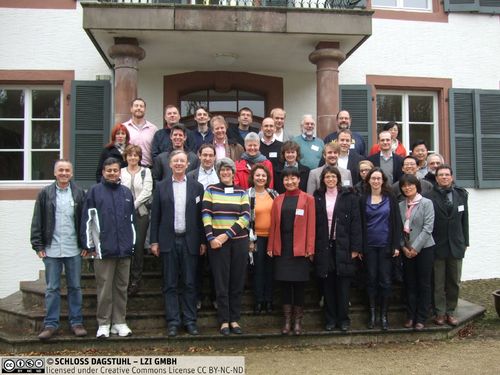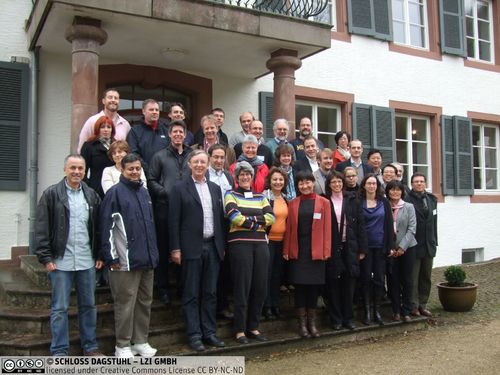Dagstuhl-Seminar 12442
Requirements Management – Novel Perspectives and Challenges
( 28. Oct – 31. Oct, 2012 )
Permalink
Organisatoren
- Jane Cleland-Huang (DePaul University - Chicago, US)
- Matthias Jarke (RWTH Aachen, DE)
- Lin Liu (Tsinghua University Beijing, CN)
- Kalle Lyytinen (Case Western Reserve University - Cleveland, US)
Kontakt
- Andreas Dolzmann (für wissenschaftliche Fragen)
- Annette Beyer (für administrative Fragen)
Programm
Since its inception in the 1970s, much of the research in requirements engineering (RE) has focused on the development of formal notations and protocols to represent requirements and to analyze their properties, such as consistency, correctness, completeness, and validity. Some work has analyzed the impacts of these requirements on downstream development tasks (e.g., traceability), or managing and reconciling conflicts in the requirements process. Much of requirements research has also assumed that the scope of RE is isolated to a specific project or even a specific stage of that project.
The demand for a shift in focus is dictated by changes in computational paradigms and capabilities that draw upon platform strategies, web services, and virtualization of both application services and development platforms. These trends have significant implications for views of modularity and requirements evolution, complexity of RE tasks, and the economics and costs related to application and service use and development. The aim of the proposed seminar is to bring together experts from multiple fields to discuss models and theories around these changes, focusing on a series of interrelated question such as:
- How to theorize and study complexity within RE tasks?
- What theoretical perspectives can inform how and why requirements knowledge evolves as it is generated, validated, and distributed?
- How requirements, system evolution, and environmental change interact?
- How different types of knowledge interact to shape requirements and their evolution?
- What are the origins and flows of influence of requirements knowledge? How can non-linear influences be effectively managed in RE evolution?
- What is the effect of speed and scale in requirements processes?
- What is the role of goals and constraints and their complex interactions in RE?
In particular we sought better integration of theories of socio-technical system evolution, distributed cognition, models of RE and design knowledge and their economic effects, the impact of strategy and related knowledge endowments in RE processes (e.g., explorative vs. exploitative processes of requirements discovery), and the role of ambiguity, uncertainty and complexity in managing requirements knowledge. Attention was also placed on new research approaches and methods that can be brought to bear in addressing these problems. The seminar thus built and expanded on some of the critical themes that had been brought up five years earlier in two NSF-sponsored workshops in Cleveland and Dagstuhl
The seminar brought together 33 researchers (exactly one third female) from 12 countries in four continents, with $22\%$ industry participation. Participants felt that this unusually high diversity together with a good mix of junior and senior people of different disciplines, interests and expertise contributed strongly to lively and fruitful discussions. Several cooperative projects have emerged from these discussions. Selected results of the discussions and presentations will be published in a special issue of the ACM Transactions on Management Information Systems in 2014.The program of the seminar was organized into four panels with plenary talks and discussion, five parallel working groups with central reporting, and a final reflection session. With the parallel Dagstuhl seminar on ``Foundations and Challenges of Change and Evolution of Ontology'' we moreover organized a crossover plenary panel session in which we tried to converge to a better mutual understanding of the different perspectives on Evolution in AI and RE and explored possibilities for future cooperation. Several individual researchers later got together to agree on specific cooperative research.
- Nicholas Berente (University of Georgia, US)
- Richard Berntsson Svensson (Lund University, SE)
- Jane Cleland-Huang (DePaul University - Chicago, US) [dblp]
- Jörg Dörr (Fraunhofer IESE - Kaiserslautern, DE)
- Xavier Franch (UPC - Barcelona, ES) [dblp]
- Gilbert Fridgen (Universität Augsburg, DE) [dblp]
- Anna Hannemann (RWTH Aachen, DE)
- Sean Hansen (Rochester Institute of Technology, US)
- Julia Heidemann (McKinsey & Company - München, DE & Universität Regensburg, DE)
- Jane Huffman Hayes (University of Kentucky - Lexington, US) [dblp]
- Matthias Jarke (RWTH Aachen, DE) [dblp]
- John Leslie King (University of Michigan - Ann Arbor, US) [dblp]
- Kim Lauenroth (adesso AG - Dortmund, DE) [dblp]
- Julio Cesar Leite (PUC - Rio de Janeiro, BR) [dblp]
- Lin Liu (Tsinghua University Beijing, CN)
- Kalle Lyytinen (Case Western Reserve University - Cleveland, US) [dblp]
- Patrick Mäder (TU Ilmenau, DE) [dblp]
- John Mylopoulos (University of Toronto, CA) [dblp]
- Andreas Oberweis (KIT - Karlsruher Institut für Technologie, DE) [dblp]
- Barbara Paech (Universität Heidelberg, DE) [dblp]
- Xin Peng (Fudan University - Shanghai, CN) [dblp]
- Barbara Pernici (Polytechnic University of Milan, IT) [dblp]
- Balasubramaniam Ramesh (Georgia State University, US) [dblp]
- Isabelle Reymen (TU Eindhoven, NL)
- William N. Robinson (Georgia State University, US)
- Christoph Rosenkranz (Goethe-Universität Frankfurt am Main, DE)
- Matti Rossi (Aalto University, FI) [dblp]
- Alistair G. Sutcliffe (Univ. of Manchester, GB)
- Fan Yang-Turner (University of Leeds, GB)
- Eric S. Yu (University of Toronto, CA) [dblp]
- Haiyan Zhao (Peking University, CN) [dblp]
- Andrea Zisman (City University - London, GB) [dblp]
- Didar Zowghi (University of Technology - Sydney, AU)
Verwandte Seminare
- Dagstuhl-Perspektiven-Workshop 08412: Science of Design: High-Impact Requirements for Software-Intensive Systems (2008-10-08 - 2008-10-11) (Details)
Klassifikation
- mobile computing
- SW-Engineering
- WWW
- internet
Schlagworte
- requirements
- evolution
- multi-model
- knowledge evolution



